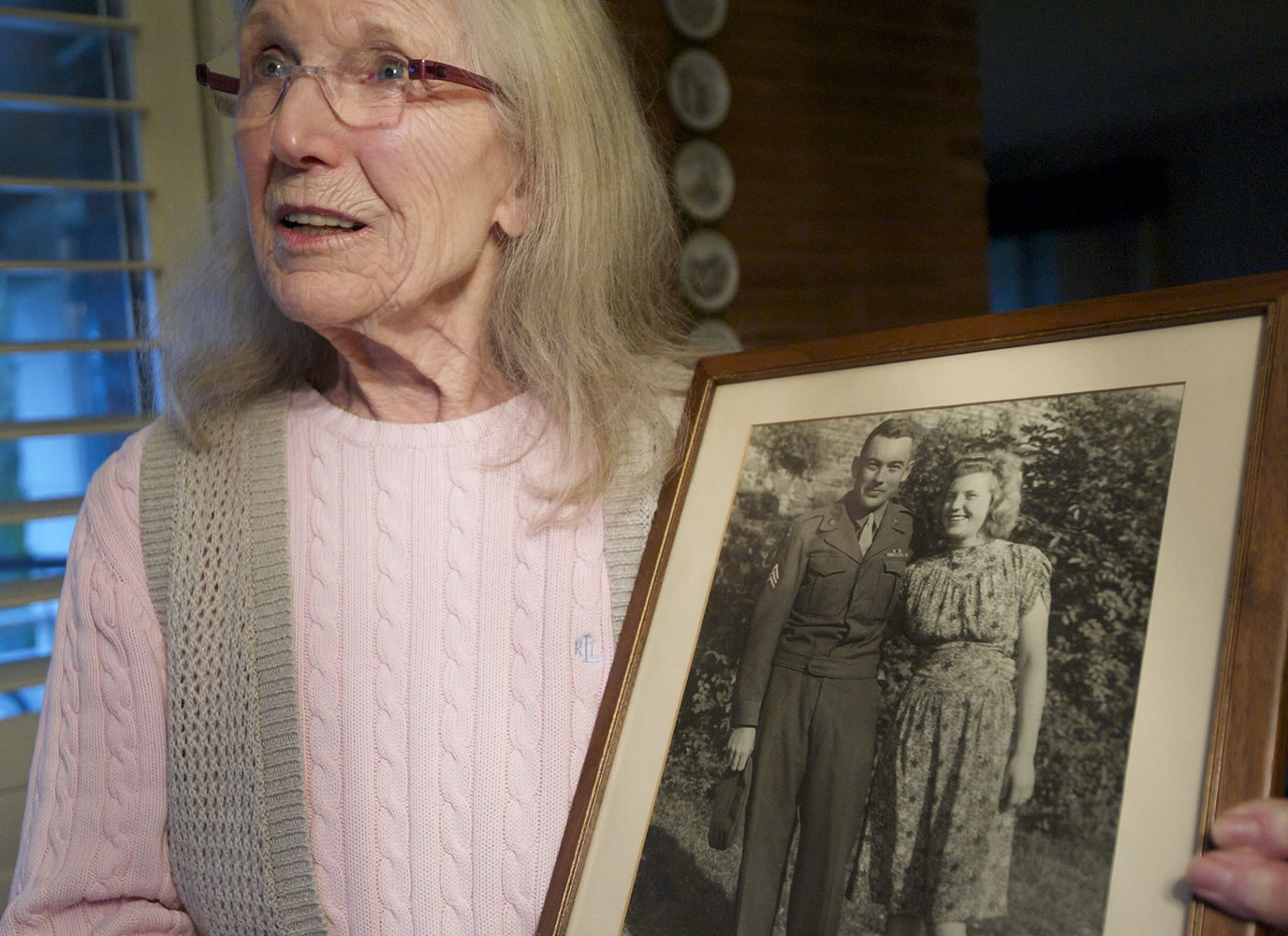In a life filled with remarkable journeys, a 14-year-old German girl was locked out of the house by her stepmother and had to set out on her own.
In 1944, constant Allied bombing prompted Gerda Velten to join her sister’s family in eastern Germany. Fearing the prospect of Soviet troops headed their way, the two sisters embarked on a 10-day trek. Pushing two children in a baby buggy, they walked 200 miles back to the safety of American- and British-held territory.
That set the stage for the biggest journey of all: a six-decade love affair with an “enemy” soldier. Of course, that’s not how Gerda and U.S. Army Sgt. Paul McMillan saw each other. The romance that brought Paul and Gerda McMillan to Vancouver is reflected in the title of her new biography: “No Enemy of Mine.”
Written by Vancouver author Terri Potts, the book is a first-person account of a girl who grew up in Hitler’s Germany, lived through World War II (some relatives were killed) and found a new life in the Pacific Northwest. The McMillans were married for 59 years before Paul died in 2007.
Gerda McMillan was among 20,000 German war brides who came to the U.S. through 1949. Those relationships initially hit a wall because of American policies on “fraternizing with the enemy.”
Although Paul and Gerda fell in love following the war, “he could not marry me because it was not permitted,” she recalled. “It was against the law. I was the enemy.”
It was an unsustainable policy, Earl Ziemke noted in his history of the Army’s occupation of Germany: “Staffs that had engineered the defeat of the (German army) were having to match wits with their own soldiers and were losing.”
In Frankfurt, where barbed wire circled the Allied headquarters compound, “Germans were remarking that the Americans were a people who built concentration camps and put themselves in them,” Ziemeke wrote.
The Army finally allowed marriages between GIs and Germans in December 1946. Sgt. McMillan was shipped back to the U.S., but gave Gerda an engagement ring before he left.
“He was discharged from the Army and told me he would come back,” the 90-year-old Vancouver woman said. “I didn’t believe it.”
Best friend vanishes
Born Gerda Velten in 1924, she can remember some aspects of life in Nazi Germany, including “Kristellnacht” — a wave of anti-Jewish violence in 1938 known as “The Night of Broken Glass.”
One day when Gerda went to school, “my best friend was gone.” Her friend was a Jew. “I never saw her again.”
Gerda’s family life didn’t offer much in the way of a safe haven. Her mother died of pneumonia when Gerda was 13; she didn’t get along with her stepmother, and when Gerda was locked out of the house, she found a job at an inn.
“I was practically on my own at 14,” she said.
Did you know?
• Gen. George Marshall, Army chief of staff and one-time Vancouver resident, was planning for the Allied occupation of Germany in 1942, barely a year after the United States entered World War II.
During the Allied bombing campaign in 1943, Gerda helped carry a friend’s children to a shelter dug into a nearby hillside.
“Every single night, they came to bomb,” she said.
The two kids went to bed fully dressed, Gerda recalled, so they wouldn’t have to huddle in the shelter — waiting for the all-clear siren — in their nightclothes.
Gerda decided in 1944 to join her sister Krystal in eastern Germany, where, she said, “Hitler sent young women with children.”
But as Hitler’s military was being defeated on both fronts, another threat loomed: the advancing Russian army.
“We heard stories about how Russian soldiers were not nice to women,” she said.
With Krystal — whose husband was a soldier on the Eastern Front — Gerda decided to return home to Bonn and reunite with her father and stepmother.
“We loaded a baby buggy and walked for 10 days, from eastern Germany to western Germany. On the road, everywhere, people were going back to the west. Each night we had to find a place to stay. My sister would go to a farmhouse and ask for food.”
Got her out of jail
Bonn was in the British-occupied zone, but Gerda happened to meet Sgt. Paul McMillan. The GI spoke German and asked the fraulein if she would like to meet him some time.
His courtship included springing Gerda from jail one night. After Paul took her home at 10:02 p.m. — a couple of minutes past curfew — a British military policeman arrested Gerda at the gate of her parents’ apartment.
“I was in a cell with four tough women. I was a country girl; I cried all night,” she said.
Paul, meanwhile, was busy trying get her released. In the morning, someone came in and asked if her name was Gerda. An American soldier was running back and forth, waving release papers and yelling, ‘Gerda! Gerda!'”
Paul had to return to the United States when his enlistment was up. That’s when Paul told Gerda that he would come back to Germany for her. Gerda was skeptical, but Paul found a way to keep his promise.
‘No Enemy of Mine’
• Terri Potts’ biography of Gerda McMillan is available for purchase at Amazon.com.
“He had to re-enlist for four years to come back and pick me up,” she said.
The non-fraternization policies had relaxed by then, and the McMillans were married in 1948. They arrived in the U.S. a couple of months later and moved in with Paul’s parents in Portland. The longtime railroad worker moved his wife to a new home in Vancouver in 1951, the same year Gerda became an American citizen.
The McMillans raised their son, Paul Jr., there, in a neighborhood overlooking the Vancouver rail yard. Potts lived across the street for a while, which is how the writer became familiar with Gerda’s saga.
Potts’ biography recounts Gerda McMillan’s life through a lot more journeys, including a trip back to West Germany in 1955. Her opportunity to reconnect with the Velten family 10 years after the end of the war included an unexpected echo of the book title.
“My sister in-law was not too fond of me,” McMillan told Potts. “I had married the enemy.”




